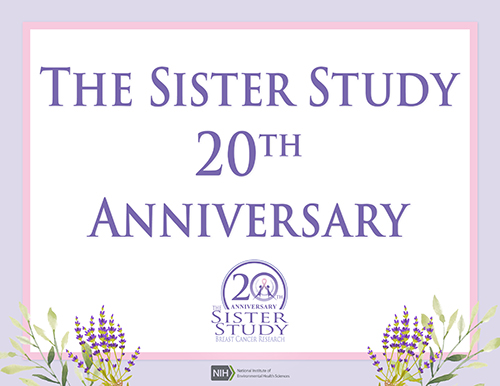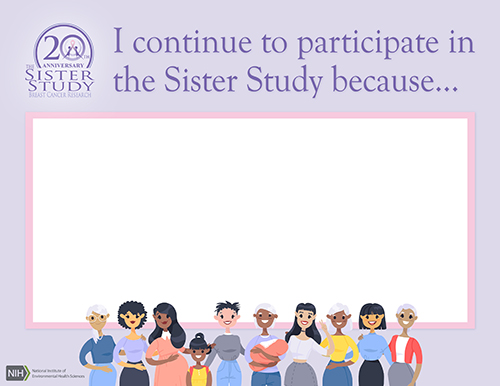Gardening is the most popular hobby- 31% of women report spending time on this activity.
What's New
The Sister Study is on Facebook!
We are excited to let you know that we have created a private Facebook group for the Sister Study to provide a forum for Sister Study participants, colleagues and friends of the study. This private group is by invitation only and not a public forum. We saw the need to have a more dynamic way of communicating with our Sister Study community than just the Sister Study website. We see the Facebook group as a real-time forum where we can post study updates, announcements, and new research findings or plans.
We know that Facebook has been in the news lately because of how they use their users' data. We want you to know that, as a research study funded by a government entity, we will abide by all NIEHS privacy policies.![]() We will not share your information with third parties. We ourselves will never post any personal and/or identifiable information on Facebook. If you decide to use your own real name, be mindful that you are responsible for that information. We will provide guidelines for what not to post, such as personal health information, treatment recommendations, and product endorsements or posts with an intent to sell. Our staff will monitor the group to make sure that policies are followed and remove inappropriate material.
We will not share your information with third parties. We ourselves will never post any personal and/or identifiable information on Facebook. If you decide to use your own real name, be mindful that you are responsible for that information. We will provide guidelines for what not to post, such as personal health information, treatment recommendations, and product endorsements or posts with an intent to sell. Our staff will monitor the group to make sure that policies are followed and remove inappropriate material.
We
invite you to follow this direct link https://www.facebook.com/groups/niehssisterstudy/ ![]() if you would like to join.
if you would like to join.
We hope you find this additional communication method helpful and that you enjoy connecting with other study participants, colleagues and friends of the study.
Read archived Sister Study Facebook Posts
The Sister Study's 20th Anniversary Celebration!
The Sister Study's 20th anniversary celebration is just around the corner, we wanted to invite our amazing participants to share their reasons for joining and continuing to participate in the vital study! Below we have add multiple flyers that we encourage you to print out and fill in with your own personal reasons for being a part of Sister Study!
We would love to see your reasons why! Please feel free to snap a photo of you and your flyer and send us an email at update@sisterstudy.org. By submitting a photo, you are consenting to your photo being shared by the Sister Study on the website, Facebook group and other communication modes. We will be sharing filled out flyers on the Sister Study Facebook, website and other 20th anniversary celebratory media. To request a flyer be mailed to you, please email update@sisterstudy.org or call 877-474-7837.
Share With Us!
Periodically we receive interesting media stories about the Sister Study and heartfelt stories from participants about why they continue to be a part of the study. We enjoy receiving these newsworthy items! Feel free to share with us and let us know if you would be willing to have your story featured on the website or in a future newsletter. Highlighting what has made participation in the Sister Study meaningful to you can be very motivating to other participants. Please go to Contact Us to request guidelines for sharing your story and to learn about the type of photograph we can best reproduce.
Thank You to Our Amazing Sisters!
Thanks to those of you who completed this year's Annual Health Update or the more detailed Health, Medical History and Lifestyle questionnaire. This year we have also approached you to complete the Family History Update as we seek to understand the role of environment and family history in breast cancer risk. You have shown your dedication for many years by consistently sharing valuable in-depth details about your health and your family's health, and by responding to so many of the various requests with which we approach you. Every year that you generously provide more information allows investigators to better understand factors related to cancer risk. Our scientists have published well over 90 scientific papers in well-respected, peer-reviewed journals. We routinely update the Sister Study Findings and Publications area on our website and encourage you to visit this link often.
Year after year you continue to show your
dedication to cancer research!
Current Initiatives
We are proud to announce that Sister Study Co-Investigator, Dr. Clarice Weinberg, received the NIEHS award for outstanding research. Read more here.
Although the Sister Study is first and foremost a breast cancer study, the information you have shared about your experiences and health gives us the opportunity to study other topics that are important for women's health. Over the years, we have written papers about the impact of early life exposures on age at menarche and menopause or risk for uterine fibroids or autoimmune diseases. More recently we have used Sister Study data to evaluate both the impact of obesity and diabetes on breast cancer risk but also to study factors that increase or decrease the chances of developing these conditions. In the future we may study other conditions that are important for women like osteoporosis and endometriosis. Some questions require collaborations across more than one study. A recent example of this is a new initiative focused on better understanding the association between residential air pollution and cardiovascular disease, specifically heart attack (myocardial infarction), stroke, and heart failure in women. We have joined forces with one of the foremost experts on this topic, Dr. Joel Kaufman, a colleague at the University of Washington. We have already worked with him to evaluate the possible link between air pollution and breast cancer. Cardiovascular conditions are leading causes of death and disability in women. Breast cancer and heart disease appear to share some risk factors. Findings from this new study may help us to identify new questions we can ask about breast cancer risk or the impact of heart disease on breast cancer risk or survival. Soon, some Sister Study participants will be asked to assist in this effort by providing permission for us to obtain their medical records relating to any heart disease or strokes that they reported on Sister Study follow-up questionnaires. Just as pathology reports and medical records are an important source of information to classify subtypes of breast or other cancers, medical records are needed to confirm and accurately classify specific types of heart disease and strokes. Thank you again for helping us make the most of the information you provide to advance women's health research!
Dr. Chandra L. Jackson, a new investigator in the Epidemiology Branch of the NIEHS, has joined the Sister Study research team. At NIEHS, she will lead research on social and environmental determinants of health equity. Chandra has a Master's degree from the Harvard T.H. Chan School of Public Health and a PhD in Epidemiology from The Johns Hopkins Bloomberg School of Public Health. Before coming to NIEHS she was a Postdoctoral Fellow in the Nutrition Department at the Harvard T.H. Chan School of Public Health and a Research Associate in the Harvard Catalyst Clinical and Translational Science Center. With nearly 5,000 African-American participants and over 2,500 Latinas, Dr. Jackson is excited to use the Sister Study data to investigate how the physical and social environments impact disparities in the relationship between sleep health and chronic diseases such as diabetes and cardiovascular disease. She will also collaborate with Dr. Sandler and others who are studying how sleep health affects risk for breast cancer and other aspects of health and well-being.
We are inviting some Sister Study participants to join a new initiative studying changes in and loss of sense of smell. Our ability to smell is the result of many complex brain activities. Scientists have shown that changes in sense of smell may be associated with neurodegenerative brain disorders such as Parkinson's disease. Our sense of smell may also be a general marker of overall brain health. While some diseases may affect our sense of smell, environmental exposure to chemicals and pollutants may also play a role. To better understand this, we are collaborating with Dr. Honglei Chen, a colleague at Michigan State University (and previously a Sister Study partner at NIEHS) to examine whether air pollutants impact sense of smell. This initiative is one of our new collaborations to study other diseases besides breast cancer in the Sister Study since you provided such in-depth information on potential environmental exposures and health.
You may recall that when you enrolled you answered many questions about your food choices, portions and how often you ate certain foods. The Sister Study has a team of diet researchers now using the data you contributed in new and innovative ways. Past research has focused on single nutrients—like fats, fruits and vegetables, or meats—one at a time. But diets are more complicated and people who eat a lot of one thing may eat less of another. Thus focusing on dietary patterns is a promising new approach. In addition to looking at dietary patterns many of us are familiar with, such as the Mediterranean diet, our team will be looking at a number of recently developed dietary patterns. One of these is the dietary inflammatory index (DII), an index based on a body of research showing that some foods are generally pro-inflammatory—that is, they promote inflammation in the body—and other foods are anti-inflammatory. Chronic low-level inflammation, which is also linked with obesity has also been associated with a number of chronic diseases, including cardiovascular disease and some cancers. Another promising dietary pattern focuses on the estrogenic potential of foods, including soy. When evaluating diets, there are many other factors to consider such as exercise, weight, and other lifestyle choices. We are in the beginning stages of this work but look forward to sharing findings shortly. It is exciting to be in a position to fully evaluate these new hypotheses and take advantage of all the diet information you shared when you enrolled!
Scientists are always looking for new ways to predict who is more likely to get breast cancer. Breast or mammographic density is one factor of interest because women with dense breasts are more likely to develop the disease, although the pathway is not clearly understood. In collaboration with Sister Study investigators, two projects have been funded to look at breast density, environmental exposures, and breast cancer. Dr. Lexie White, a Sister Study fellow, is looking at the link between environmental air contaminants and breast density. The hypothesis she is investigating is that women with higher exposures to these pollutants will have higher breast density, which may also result in women being more likely to develop breast cancer. The second project is a collaboration with Columbia University in which we are studying changes in mammographic density over time among Sister Study participants. Breast density is higher in premenopausal women and decreases with age. Investigators want to learn if the amount of change in breast density, especially during the menopausal transition, is tied to breast cancer risk. We are inviting some women with and without breast cancer in the Sister Study to join in this effort by giving us permission to retrieve previous mammograms.
The Sister Study data that you contribute is going further by contributing to larger pooling studies that want to look for new risk factors for breast cancer. Pooling studies pull together data from multiple studies and can look at possible risk factors or cancer outcomes that are too rare to investigate in the Sister Study alone. For example, Sister Study PI Dr. Dale Sandler and Dr. Hazel Nichols, a former Sister Study fellow and current assistant professor at the University of North Carolina, are leading an effort to evaluate risk factors for breast cancer among premenopausal women. Specifically, they are exploring risk factors that may behave differently in premenopausal breast cancer. For example, it is well known that obesity contributes to risk of postmenopausal breast cancer. This may not be the case for premenopausal breast cancer. Of special interest is an apparent increase in breast cancer risk that occurs shortly after pregnancy. While pregnancy is well-recognized as being associated with reduced risk of breast cancer, there is some evidence that risk increases shortly after pregnancy before it declines many years later. Because breast cancer is rare after pregnancy, the existence and timing of this risk cannot be studied in a single study alone. The Sister Study has also contributed data to look at antimüllerian hormone (AMH), a biomarker of ovarian reserve that is highest in late childhood/early adulthood and begins to decline around age 25 until menopause. Higher levels of AMH levels have previously been related to breast cancer risk in a subset of premenopausal women participating in the Sister Study. A combined study gives us more ability to fully evaluate this association. In addition, Sister Study data is contributing to multiple projects looking at genes related to breast cancer risk and tumor characteristics which gives researchers a greater ability to identify environmental and genetic risk factors for breast cancer and survival.
Follow-Up Questionnaires
Family Health Update
Many Sister Study participants are aware of the relevance that cancer history of close biological relatives has on research like the Sister Study. In fact, many have shared their family’s health updates over the years. With the Family Health Update questionnaire, we will be systematically collecting family health history details from each participant. Collecting this information will enable us to evaluate newer tools to predict breast cancer risk (for example, BRCAPRO and BOADICEA) as well as to continue developing new and even better tools. As better risk prediction is developed, it will give health care providers and women options for more effective and targeted screening, catching breast cancer earlier or potentially even preventing it. This gets directly at the heart of why many participants joined: so our future generations do not have to face cancer. For more information, please contact the Sister Study helpdesk toll-free at 877-4SISTER (877-474-7837) or e-mail us at update@sisterstudy.org.
Detailed Follow-up
Regular Sister Study follow-up efforts are ongoing. In an effort to reduce the burden on our study participants, we have changed the schedule of the long-form follow-up questionnaires from every two years (biennial) to every three years (triennial). We will ask you to complete a detailed online or paper follow-up questionnaire. You may also complete the questionnaire by telephone. The follow-up questionnaire updates your health status in more detail than the Annual Health Updates and allows us to ask questions that address new theories about breast cancer. The success of this research effort depends on everyone’s full participation. We are hopeful that with each piece of information you provide, we will be one step closer to discovering the causes of breast cancer and learning ways to prevent this disease. Please continue to help by completing and returning your completed questionnaires promptly.
annual health update
Regular Sister Study follow-up efforts are ongoing. Every year, we will send you an Annual Health Update: a quick online or paper questionnaire about changes in your address or health (for example, a diagnosis of breast cancer or a heart attack). We ask you to complete and return it promptly even if there have not been any changes to your health. You may also complete the questionnaire by telephone.
If you received a request from the Sister Study to complete the current year’s Follow-Up Questionnaire and would like to complete it online, you will need your Sister Study ID and other information that was provided via e-mail or in the materials you received by mail. If you do not have the information you need to get started, please call the Sister Study helpdesk toll-free at 877-4SISTER (877-474-7837) or e-mail us at update@sisterstudy.org and a helpdesk staff person will be happy to help.
Call for Spoke's-Sisters
We are periodically contacted by media outlets to report on Sister Study progress. Reporters are not only interested in study results, but are also interested in who the participants are and why you continue to participate and remain so committed to this research. The Sister Study participants humanize our research and deepen media stories. If you are a participant in the Sister Study and would like to give us permission to contact you for media stories, please go to Contact Us for ways to contact the Sister Study. We will always approach you first before sharing your contact information with the reporter.


